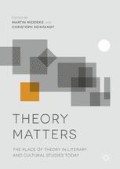Abstract
The trend in narratological research over the last two decades has been to diversify into a range of contextual narratologies, whilst at the same time consolidating the sense of narrative as a foundational cognitive concept; a sense consequent upon the ‘narrative turn’ across a range of disciplines in the humanities and beyond. These are fundamentally opposed tendencies: the first as a move beyond formalism to culturally situated, ideological views of narrative; the second as a new universalism based upon neurological and evolutionary premises. But both have resulted in a diminishment of the theoretical dimension of literary narratology, in favour of ‘applied’ narratological readings intended to illuminate the particular case, or to revise the received typologies and terminologies of the structuralist heritage. Contextualist narratologies have rarely moved beyond formalism without also subordinating theory to interpretation; cognitive narratology has tended to invoke the sciences of the mind as a source of new concepts and terms with which to describe the experience of the literary text, and the value of that encounter. This essay is concerned to affirm the value of literary narrative study, but suggests that such affirmation is not to be found in the broad idea that such study is vindicated by the evident importance and ubiquity of narrative as a mode of sense-making. Rather, it argues for the theoretical role of narratology as a highly tuned analytical perspective upon that ubiquity, in reciprocal dialogue with the various disciplinary discourses in which it is now recognized, whether as an opportunity or a problem. Narrative theory is hence a crucial interdiscipline able both to demonstrate the value of narrative and to critique its limitations throughout the range of its current relevance as a means and object of study. As an illustrative limit case, the essay considers the relation between narrative theory and complexity science, both as an exemplary dialogue across the ‘two cultures‘ divide, and as the basis for a renewed concept of the distinctive contribution of literary narrative studies within such an enlarged sphere of academic and social relevance.
Access this chapter
Tax calculation will be finalised at checkout
Purchases are for personal use only
Bibliography
Abbott, H. Porter. ‘Unnarratable Knowledge: The Difficulty of Understanding Evolution by Natural Selection’. Narrative Theory and the Cognitive Sciences. Ed. D. Herman. Stanford: CSLI Publications, 2003. 143–62.
Abbott, H. Porter. ‘Narrative and Emergent Behavior’. Poetics Today 29.2 (2008): 227–44.
Barthes, Roland. S/Z. Trans. Richard Miller. New York: Farrar, Straus and Giroux, 1974 (1973).
Fludernik, Monika. Towards a ‘Natural’ Narratology. London/New York: Routledge, 1996.
Genette, Gérard. Narrative Discourse. Trans. Jane E. Lewin. Oxford: Basil Blackwell, 1980 (1972).
Gymnich, Marion. ‘Linguistics and Narratology: The Relevance of Linguistic Criteria to Postcolonial Narratology’. Literature and Linguistics: Approaches, Models and Applications. Ed. Marion Gymnich et al. Trier: WVT, 2002. 61–76.
Herman, David. Story Logic: Problems and Possibilities of Narrative. Lincoln: University of Nebraska Press, 2002.
Herman, David. ‘Introduction’. Narrative Theory and the Cognitive Sciences. Ed. David Herman. Stanford: CSLI Publications, 2003. 1–30.
Johnson, Steven. Emergence: The Connected Lives of Ants, Brains, Cities, and Software. London: Allen Lane, 2001.
Keen, Suzanne. Empathy and the Novel. Oxford: Oxford University Press, 2007.
Lanser, Susan. ‘Toward a Feminist Narratology’. Style 20 (1986): 341–63.
Lanser, Susan. Fictions of Authority: Women Writers and Narrative Voice. Ithaca: Cornell University Press, 1992.
‘Narrative and Complex Systems’. ICNS: Interdisciplinary Centre for Narrative Studies, University of York. http://www.york.ac.uk/narrative-studies/research-themes/complex-systems/. Date accessed: 12 September 2014.
Page, Ruth E. Literary and Linguistic Approaches to Feminist Narratology. Basingstoke/New York: Palgrave Macmillan, 2006.
Palmer, Alan. Fictional Minds. Lincoln: University of Nebraska Press, 2004.
Phelan, James. Narrative as Rhetoric: Technique, Audiences, Ethics, Ideology. Columbus: Ohio State University Press, 1996.
Phelan, James. Experiencing Fiction: Progressions, Judgments, and the Rhetorical Theory of Narrative. Columbus: Ohio State University Press, 2007.
Phelan, James and Peter Rabinowitz. ‘Introduction: Understanding Narrative’. Understanding Narrative. Ed. James Phelan and Peter Rabinowitz. Columbus: Ohio State University Press, 1994. 1–16.
Prince, Gerald. ‘On a Postcolonial Narratology’. A Companion to Narrative Theory. Ed. James Phelan and Peter Rabinowitz. Oxford: Blackwell, 2005. 372–81.
Snow, C. P. The Two Cultures. London: Cambridge University Press, 1993 (1959).
Sommer, Roy. ‘“Contextualism” Revisited: A Survey (and Defence) of Postcolonial and Intercultural Narratives’. Journal of Literary Theory 1 (2007): 61–79.
Stepney, Susan and Richard Walsh, eds. Narrating Complexity. London: Springer, forthcoming.
Turner, Mark. The Literary Mind. New York: Oxford University Press, 1996.
Walsh, Richard. The Rhetoric of Fictionality: Narrative Theory and the Idea of Fiction. Columbus: Ohio State University Press, 2007.
Walsh, Richard. ‘Emergent Narrative in Interactive Media’. Narrative 19.1 (2011): 72–85.
Warhol, Robyn. Gendered Interventions: Narrative Discourse in the Victorian Novel. New Brunswick: Rutgers University Press, 1989.
Zunshine, Lisa. Why We Read Fiction: Theory of Mind and the Novel. Columbus: Ohio State University Press, 2006.
Author information
Authors and Affiliations
Editor information
Editors and Affiliations
Copyright information
© 2016 The Editor(s) (if applicable) and The Author(s)
About this chapter
Cite this chapter
Walsh, R. (2016). Narrative Theory at the Limit. In: Middeke, M., Reinfandt, C. (eds) Theory Matters. Palgrave Macmillan, London. https://doi.org/10.1057/978-1-137-47428-5_19
Download citation
DOI: https://doi.org/10.1057/978-1-137-47428-5_19
Published:
Publisher Name: Palgrave Macmillan, London
Print ISBN: 978-1-137-47427-8
Online ISBN: 978-1-137-47428-5
eBook Packages: Literature, Cultural and Media StudiesLiterature, Cultural and Media Studies (R0)

